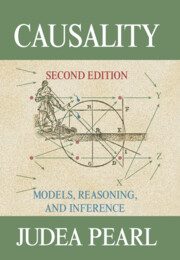Book contents
- Frontmatter
- Dedication
- Contents
- Preface to the First Edition
- Preface to the Second Edition
- 1 Introduction to Probabilities, Graphs, and Causal Models
- 2 A Theory of Inferred Causation
- 3 Causal Diagrams and the Identification of Causal Effects
- 4 Actions, Plans, and Direct Effects
- 5 Causality and Structural Models in Social Science and Economics
- 6 Simpson’s Paradox, Confounding, and Collapsibility
- 7 The Logic of Structure-Based Counterfactuals
- 8 Imperfect Experiments: Bounding Effects and Counterfactuals
- 9 Probability of Causation: Interpretation and Identification
- 10 The Actual Cause
- 11 Reflections, Elaborations, and Discussions with Readers
- Epilogue The Art and Science of Cause and Effect
- Bibliography
- Name Index
- Subject Index
7 - The Logic of Structure-Based Counterfactuals
Published online by Cambridge University Press: 05 March 2013
- Frontmatter
- Dedication
- Contents
- Preface to the First Edition
- Preface to the Second Edition
- 1 Introduction to Probabilities, Graphs, and Causal Models
- 2 A Theory of Inferred Causation
- 3 Causal Diagrams and the Identification of Causal Effects
- 4 Actions, Plans, and Direct Effects
- 5 Causality and Structural Models in Social Science and Economics
- 6 Simpson’s Paradox, Confounding, and Collapsibility
- 7 The Logic of Structure-Based Counterfactuals
- 8 Imperfect Experiments: Bounding Effects and Counterfactuals
- 9 Probability of Causation: Interpretation and Identification
- 10 The Actual Cause
- 11 Reflections, Elaborations, and Discussions with Readers
- Epilogue The Art and Science of Cause and Effect
- Bibliography
- Name Index
- Subject Index
Summary
And the Lord said,
“If I find in the city of Sodom fifty good men,
I will pardon the whole place for their sake.”
Genesis 18:26Preface
This chapter provides a formal analysis of structure-based counterfactuals, a concept introduced briefly in Chapters 1 and 3 that will occupy the rest of our discussion in this book. Through this analysis, we will obtain sharper mathematical definitions of other concepts that were introduced in earlier chapters, including causal models, action, causal effects, causal relevance, error terms, and exogeneity.
After casting the concepts of causal model and counterfactuals in formal mathematical terms, we will demonstrate by examples how counterfactual questions can be answered from both deterministic and probabilistic causal models (Section 7.1). In Section 7.2.1, we will argue that policy analysis is an exercise in counterfactual reasoning and demonstrate this thesis in a simple example taken from econometrics. This will set the stage for our discussion in Section 7.2.2, where we explicate the empirical content of counterfactuals in terms of policy predictions. Section 7.2.3 discusses the role of counterfactuals in the interpretation and generation of causal explanations. Section 7.2 concludes with discussions of how causal relationships emerge from actions and mechanisms (Section 7.2.4) and how causal directionality can be induced from a set of symmetric equations (Section 7.2.5).
In Section 7.3 we develop an axiomatic characterization of counterfactual and causal relevance relationships as they emerge from the structural model semantics. Section 7.3.1 will identify a set of properties, or axioms, that allow us to derive new counterfactual relations from assumptions, and Section 7.3.2 demonstrates the use of these axioms in algebraic derivation of causal effects. Section 7.3.3 introduces axioms for the relationship of causal relevance and, using their similarity to the axioms of graphs, describes the use of graphs for verifying relevance relationships.
The axiomatic characterization developed in Section 7.3 enables us to compare structural models with other approaches to causality and counterfactuals, most notably those based on Lewis's closest-world semantics (Sections 7.4.1–7.4.4). The formal equivalence of the structural approach and the Neyman–Rubin potential-outcome framework is discussed in Section 7.4.4. Finally, we revisit the topic of exogeneity and extend our discussion of Section 5.4.3 with counterfactual definitions of exogenous and instrumental variables in Section 7.4.5.
Information
- Type
- Chapter
- Information
- CausalityModels, Reasoning, and Inference, pp. 201 - 258Publisher: Cambridge University PressPrint publication year: 2009
Accessibility standard: Unknown
Why this information is here
This section outlines the accessibility features of this content - including support for screen readers, full keyboard navigation and high-contrast display options. This may not be relevant for you.Accessibility Information
- 4
- Cited by
